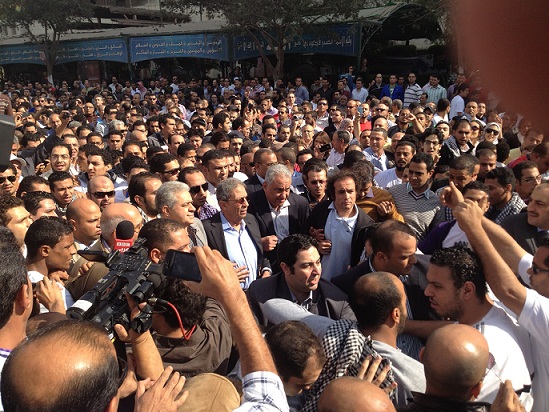
It may have dawned on Egypt’s opposition forces that weeks of protests, sit-ins and a very bloody confrontation are doing little to lead to the postponement of an upcoming referendum to ratify a contentious draft constitution.
With only three days until the vote, and with Egyptians abroad already at the polls, it seems that opposition forces decided to opt to mobilize for a ‘no’ vote, concluding that this is the only approach left in an attempt to prevent the constitution from passing.
On Wednesday morning, the National Salvation Front, headed by Mohamed ElBaradei and comprising former presidential candidates Hamdeen Sabahi and Amr Moussa, called on all Egyptians to vote against the draft constitution, provided that certain conditions are fulfilled.
According to news reports, the conditions include holding the vote on one day only, unlike the proposed staggering of the referendum that would separate the two voting days by a week. Other preconditions include the referendum taking place under full judicial supervision, the deployment of security inside and outside the polling stations, allowing international and national civil society monitors to observe the process, starting the counting process after the polling stations close and announcing the results immediately.
The judiciary’s participation in the upcoming referendum is not, however, a unilateral decision. The High Elections Commission announced that 9,000 judges have agreed to supervise the referendum, despite the National Judges’ Club standing by its choice to boycott. A lack of judges is also believed to be the reason behind dividing the voting process into two days.
Two days earlier, the Strong Egypt Party, headed by former presidential candidate Abdel Moneim Aboul Fotouh, said it will also launch a campaign to push for a ’no‘ vote.
The Constituent Assembly, which saw waves of walkouts over the past month, rushed a vote on the draft constitution’s 234 articles, after which President Mohamed Morsi announced that it would be up for referendum.
Opposition forces have long called for protests, sit-ins and even civil disobedience to pressure Morsi into postponing the referendum as well as canceling a controversial constitutional declaration issued late last month. While Morsi heeded one of these demands by canceling the declaration last Saturday, he maintained that the referendum would still be held as scheduled.
The opposition was faced with a tough decision, one that appears to have been held off in the hopes that a complete lack of a judicial supervision would result in a postponement. With it being clear that the president is adamant on holding the referendum on time, it is now up to opposition forces to scramble and campaign for a ‘no’ vote.
Indeed, campaigns for a ‘no’ vote seem to be drowning out calls for a boycott, the latter stemming out of rejection of the whole process. Skeptics of the former de-facto ruler of the country, SCAF, chose to boycott previous votes, such as the presidential elections last June and the March 2011 referendum, to deny them legitimacy.
While those who abstain from the vote make a strong political statement, they are seldom enough to affect the turnout or the outcome – and can in no way be quantified. This round some may have learned from past mistakes, where a boycott only worked in their opponent’s favor. If nothing else, the opposition can use the next few days to connect with their constituency, and better understand their capabilities in connecting with people at the grassroots level – a skill that will be needed in the next phase of parliamentary elections.
A campaign titled “No to the constitution,” is also in full swing, with infomercials raising awareness about the draft’s flaws as well as printing and distributing flyers all over Egypt’s governorates.
Protesters around the Presidential Palace carry banners that read ‘No to the constitution.’ While they continue to denounce the draft constitution and the referendum, they seem to be leaning towards voting against it in any case.
Sherwet Kafafi, a communications manager who joined one of the million-man protests in front of the Presidential Palace, said she wouldn’t “fall for calls of boycott again,” and that this was how “we got stuck with Morsi.”
As a liberal Muslim, she said, she fully trusts liberal forces such as the National Salvation Front to make the decision for her.
Raoof Ammar, an engineer, said that while he believes the opposition needs to maintain pressure on Morsi through protests and sit-ins in hopes that he cancels the referendum, he will still vote against the draft constitution should the vote take place.
The Muslim Brotherhood’s ability to mobilize a vote has been unmatched, it is still unclear whether a liberal and secular forces’ unified vote will be enough to contest it. It is also unclear how the opposition’s preconditions will affect the process, particularly as they come to the table with little leverage, and only three days left for the voting to begin.
Dalia Rabie is a journalist based in Cairo. She worked as the Features Editor for Daily News Egypt where she covered topics ranging from politics to culture and lifestyle, with a special focus on human interest issues.
Image: National-Liberation-Front.jpg
